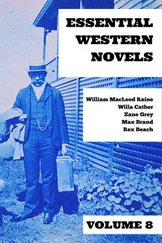Again that roar! It is like the booming of a thousand cannons. It is steady now and unceasing; it rushes forward along the dense walls of spectators that throng the streets on either side of the way up which Hector D’Estrange has to pass.
A whisper runs through the vast hall, a whisper of suppressed excitement and expectation. “He is coming; he is coming!” is on every one’s lips, as with eyes aglow and hearts thrilling with eagerness, the people bend forward in their seats to watch for him.
The crowds outside the building have begun to cheer. The martial music is very distinct now. The plaudits are every moment becoming more intense, until they break into a deep and prolonged roar. As they do so, the great folding doors of the Hall of Liberty are thrown open, and the people rise in a body to their feet.
He is entering now. Preceded by the band of the White Regiment of the Women’s Volunteer Companies, playing a march triumphant, he passes through the giant portals. His head is bared, and he is mounted on a milk-white horse, which he sits with grace and ease. As he does so the sun shines down on his dark auburn hair, lighting it up with the tints of old-gold that play amidst the curls which nestle on his high, white brow, while the sapphire light in his glorious eyes shoots forth with a gleam of triumph as he surveys the magnificent scene.
He is dressed in the White Guard Regiment uniform of the Women’s Volunteer Companies, of which he is Commander-in-Chief; but the regiment itself is his own especial one. It was the first which he established four and a half years ago, when he first took the matter in hand. The idea has prospered since then, and the women enrolled in all the companies of the Volunteer force number 200,000.
It is a fitting uniform for the occasion, one which he has done well to don; for the first business of today’s ceremonial will be the march past of the “picked” of the companies of these 200,000.
He has ridden round the broad, spacious horse-ride followed by one or two especial friends, conspicuous amongst whom is the Duke of Ravensdale. The cheering is deafening; it never ceases for a moment. It swells and swells again, like the mighty mid-ocean waves, that bear onwards in their wild career to break on the lone sea-shore.
And now he has dismounted, and, with his friends, has taken his place on the evergreen flower-decked platform. Even as he does so his dark sapphire eyes are raised aloft, and sweep with their dreamy gaze the thousands that throng that vast Hall of Liberty, as if seeking amidst the multitude one especial form. It is even so; and as they roam the sea of faces, all turned to his, they are suddenly brought to a standstill. The anxious, searching look within them dies away, giving place to one of calm contentment and repose, for Speranza is there.
The mother’s eyes are fixed upon her child. Through the filmy distance of space cannot Gloria perceive this well? For a moment, one brief moment, the hero of the hour is Gloriana de Lara, in the next, he is Hector D’Estrange. The audience is still cheering,—it seems as though it will never cease,— but he has raised his hand, and like magic a great silence falls.
“Ladies and gentlemen,” he begins, and the clear, exquisite voice thrills through the huge building, “I shall have a few words to say to you before I declare the Hall of Liberty open, but first we will witness the march past of the representatives of all the companies of the Women’s Volunteer force of which I have the honour to be Commander-in-Chief.”
A flourish of trumpets and loud cheering greets this announcement. Once more the great entrance doors unfold, the band of the White Regiment strikes up a march, as through the portals, ten abreast, and mounted on grey horses, that regiment advances at a trot.
And at their head is one whom we have seen before. Very handsome she looks in her uniform of pure white cloth, with the gold facings glittering on her breast, and her sword in its silver sheath dangling sparkling at her side. Flora Desmond is not greatly changed since we saw her last, in appearance certainly, but over her life has come a wondrous transformation. She is Hector D’Estrange’s right hand, and in aiding him to carry out his noble aims is thoroughly’ in her element.
The white troopers advance at a trot rapid enough, but as each line passes the platform on which Hector D’Estrange is standing they break into a canter, increased to a gallop, whirling round the broad-spaced horse-ride in magnificent order. Looking along the serried line of horses’ heads hardly a hair’s breadth in difference can be distinguished, so compact is the position which is maintained throughout the ranks.
The march strains cease, and give way to a flourish of trumpets. Simultaneously the galloping steeds are reined on to their haunches, remaining motionless as statues. Thus they stand until the voice of Flora Desmond is heard giving the order to retreat, when they fall into position, and retire at the trot, she riding-round to join her chief on the platform.
And in this wise, headed by their respective bands and officers, representative companies of Hector D’Estrange’s two hundred regiments march or gallop past him. The ceremony occupies some two hours, but they roll by all too quickly for the spectators, who, spellbound by what they see, watch the revolving-scenes with the keenest interest.
The last one closes appropriately. Crashing and rumbling through the wide-opened entrance dash the artillery. They come on at a rapid pace, and wheeling round into the vast arena form up into splendid line. The work of detaching the horses and unlimbering the guns is that of a moment. In the next, a tremendous roar rings forth from the mouths of a score of cannon which have been rapidly charged and fired.
Ere the echoes have died away the horses are again attached, the guns as rapidly limbered up, and one by one the gun-carriages dash from the scene, the great doors closing upon them.
Then cheer after cheer rings through the densely packed building as Hector D’Estrange advances to the front of the platform to speak. But he is raising his hand once more, as though appealing to be heard, and again a great silence falls.
“We are here today,” the bright, clear ringing voice declares, “to open a building the magnitude of which cannot be measured by any other in the world. The Hall of Liberty stands here to day as a living witness to the desire of woman to be heard. It was six years ago that I first saw it in my dreams. It is reality now, and will endure through all time, as a memorial of the first great effort made by woman to shake off the chains of slavery, that ever since our knowledge of man began, have held her a prisoner in the gilded gaols of inactivity and helplessness. I stand here today prepared to deny that woman is the inferior of man, either in mental capacity or physical strength, provided always that she be given equal advantages with him. I go further still, and declare that in the former respect she is his superior. You deny it? Then give her the chance, and I have no fear but that she will prove that I have not lied. You have today seen passed in review 10,000 representatives of the 200,000 volunteers that in a little more than four years have been enrolled and drilled into the splendid efficiency witnessed on this memorable occasion. Will you pretend or seek to tell yourselves that in warfare they would be unavailing? I laugh such an idea to scorn. One of our most heart-stirring writers—I allude to Whyte–Melville—has left it declared in his writings, ‘that if a legion of Amazons could be rendered amenable to discipline they would conquer the world.’ He was right. The physical courage, of which men vaunt so much, is as nothing when compared with that greater and more magnificent virtue, ‘ moral courage,’ which women have shown that they possess in so eminent a degree over men; and hence physical courage would come as an agreeable and welcome visitor where hitherto it has been forcibly denied admission.
Читать дальше












